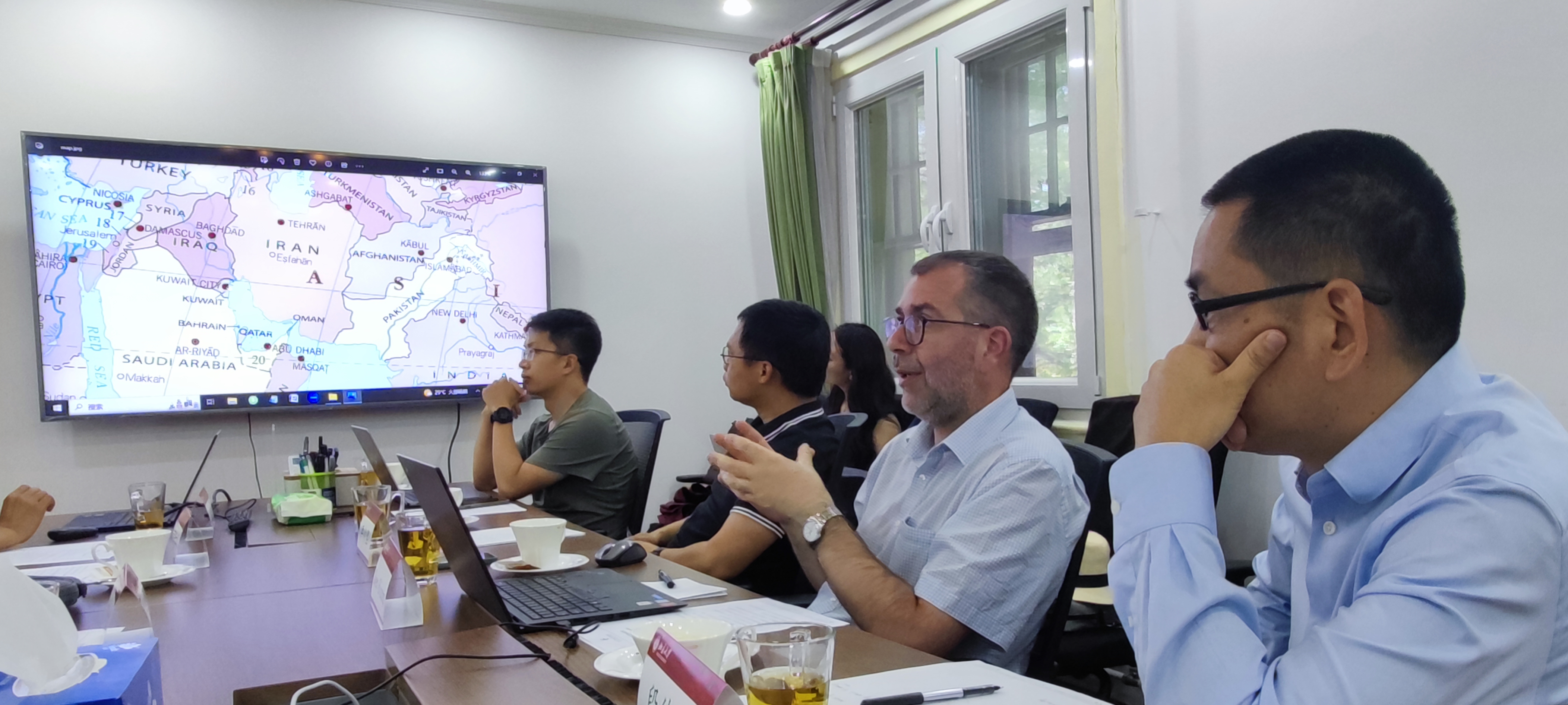
On July 4, the second lecture of the “Adventus Amicorum” seminar series celebrating the fifth anniversary of the Institute of Area Studies, Peking University (PKUIAS) was held at No. 66 Yannanyuan. The seminar featured Sven Biscop, a professor at the Institute for International and European Studies of Ghent University, a regular speaker of the Royal Military Academy in Brussels and a senior research associate of Renmin University of China, as the keynote speaker. The seminar was chaired by Zhang Yongle, deputy director of PKUIAS and associate professor at the School of Law. Liu Zuokui, deputy director of the Institute of European Studies of Chinese Academy of Social Sciences; Qu Bing, associate research fellow of the Institute of European Studies of China Institutes of Contemporary International Relations; Yan Shaohua, associate research fellow of the Institute of International Studies, Fudan University; and Xie Kankan, assistant professor of the School of Foreign Languages, Peking University, participated in the discussion.
Prof. Biscop’s lecture was titled “Europe Rediscovers Geopolitics”. He began by stressing the importance of accurately defining the terms “geopolitical” and “strategic.” He explained that “strategic” refers to defending one’s interests in a calculated manner, while “geopolitics” refers to the influence of geography on those calculations. Prof. Biscop then gave a brief introduction to the geopolitical implications of the Ukraine Crisis from the perspective of Brussels and the EU’s updated geopolitical attitude toward Europe, the Caucasus and Central Asia, the Middle East and Africa, and East Asia, using the world’s political regions as clues.
In terms of Europe, it has once again become firmly divided with the appearance of a hard border. Ukraine is now effectively a member of the Western European security system. With regard to the Ukraine Crisis, the EU has two main objectives. First, as a border state of the EU, Ukraine must remain as strong as possible on the largest possible territory, including access to the Black Sea. Second, this conflict must be contained and remain a conventional proxy war between Ukraine and Russia.
In the Caucasus and Central Asia, Russia serves as a security guarantor. At present, some people believe that Russia no longer has enough strength to maintain its traditional role in the Caucasus and Central Asia.
Regarding the Middle East, Prof. Biscop mentioned the recent reconciliation between Iran and Saudi Arabia through China’s mediation and pointed out that, while the EU had been renegotiating some energy deals with Middle Eastern countries, its political and security presence in the region remained weak.
In the view of Prof. Biscop, the expansion of Russia’s influence in Africa has mainly been achieved through the Wagner Group. Recent changes within Russia are unlikely to affect its overall strategy in Africa.
Prof. Biscop ended his lecture by analyzing the current global landscape and international order. He expressed his belief that we have been living in a multi-polar world since the end of the Cold War. Per Biscop, the four global players in this world are the US, Russia, China and the EU. This international order is based on the national interests of all countries. All countries need to discuss the facts, seek cooperation points based on common interests and avoid conflicts brought about by ideological prejudice and the Cold War mentality.
During the final discussion, Prof. Duan Demin praised Prof. Biscop’s realistic and practical geopolitical perspective, emphasizing that international relations should not be seen as simply a struggle between good and evil. Prof. Duan then asked, does the EU have a sufficient independent strategy? According to Liu Zuokui, Prof. Biscop’s presentation on the current geopolitical situation was more pragmatic and diversified than some other Eurocentric analyses. However, it was also important to take domestic factors into consideration. Qu Bing shared his prediction about the possible future development of the Ukraine Crisis, suggesting that the war may be prolonged and even reach a stalemate. He also asked what were the EU’s and NATO’s security guarantees for Ukraine? Yan Shaohua stressed that the EU and China had to learn to work together on issue-based coalitions. To promote mutual understanding and build trust, both sides needed to compartmentalize different issues and not let potential disagreements escalate into tense conflicts. Xie Kankan raised a concern about whether the EU’s political interests might overshadow its economic interests. In the end, Prof. Zhang Yongle asked how the Ukraine Crisis affected Europe’s self-positioning and how to evaluate the role of Turkey. Prof. Biscop answered their questions one by one.
Prof. Biscop has long been concerned about the strategic autonomy of the EU and has written a series of books, such as European Strategy in the 21st Century and The European Security Strategy. His book Make Europe Great Again has already been published in Chinese.


